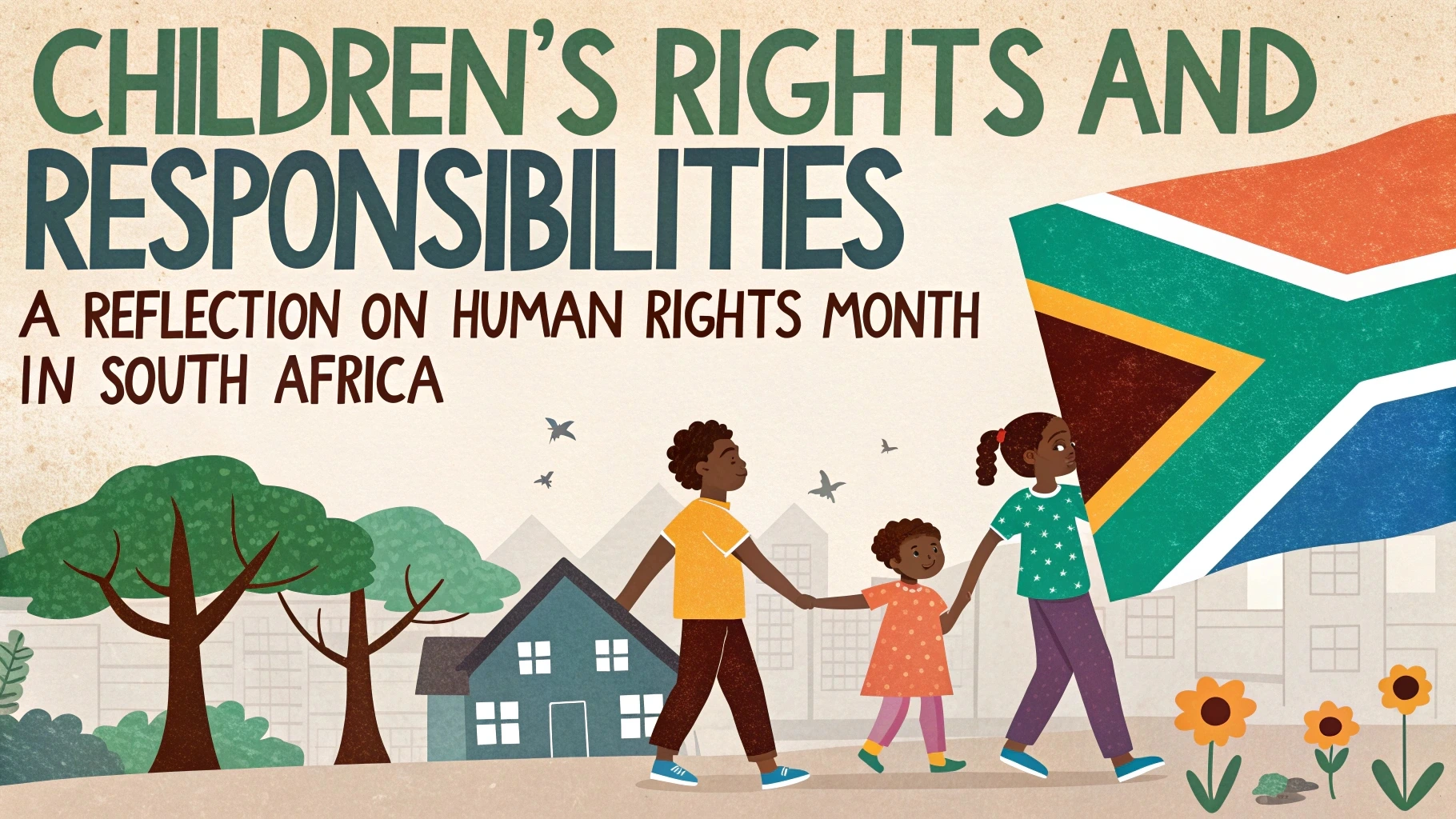March marks Human Rights Month in South Africa, a time to reflect on the nation’s democratic journey and celebrate the fundamental rights that form the backbone of the country's Constitution. Central to this celebration are children’s rights, which are crucial for their well-being and development. As we reflect on these rights, it’s equally important to consider the responsibilities that come with them, shaping children’s roles as active members of society. In this blog, we’ll explore children’s rights and responsibilities in South Africa, their interconnection, and the support systems in place to ensure that both are upheld.
What Are Children's Rights?
Children’s rights are a set of protections and entitlements designed to safeguard the well-being of individuals under 18. In South Africa, children’s rights are enshrined in the Constitution, particularly Section 28, and are further supported by international treaties like the United Nations Convention on the Rights of the Child (UNCRC), to which South Africa is a signatory.
These rights include:
- The right to life, survival, and development
- The right to education, healthcare, and social services
- The right to family care, shelter, and nutrition
- The right to be protected from abuse, neglect, and exploitation
These rights ensure that children are treated with dignity, respect, and care, with their best interests being paramount in all decisions affecting them.
Key Rights of Children in South Africa
Under South African law, children’s rights are specifically protected by the Constitution, which outlines various entitlements. Key rights include:
- Right to Education: Every child has the right to receive an education, and they are legally obligated to attend school until the age of 15 or grade 9, whichever comes first. This ensures that children have the opportunity to develop the skills and knowledge necessary for future success.
- Right to Protection from Abuse and Neglect: Children are safeguarded from maltreatment, neglect, and exploitation. This includes protection from harmful labor practices and ensuring they are not subjected to work that could harm their health, development, or well-being.
- Right to Healthcare: All children are entitled to access healthcare services, which are essential for ensuring their survival and healthy development. This includes access to vaccines, treatment for illnesses, and maternal health services.
- Right to Family Life: Children have the right to be cared for by their families or, where that is not possible, by an appropriate alternative caregiver. The state has an obligation to ensure children are provided with a safe and nurturing environment.
- Right to Play and Leisure: Children should be given opportunities to engage in recreational activities that are essential for their physical, emotional, and social development.
Children's Responsibilities in Society
While children’s rights are clearly defined, their responsibilities are less formally outlined but are equally important for their development and integration into society. These responsibilities include:
- Respect for Others: Children are expected to respect the rights of others, including peers, teachers, and family members. This fosters an environment of mutual respect and understanding.
- Respect for the Law: Children must abide by the law. In South Africa, the minimum age of criminal capacity is set at 10, though those under 14 are presumed to lack criminal capacity unless proven otherwise.
- Contributing to Household and Social Duties: As they grow, children are expected to contribute to household chores and family responsibilities, developing a sense of duty and contributing to their community.
- Maintaining Their Health: Children are encouraged to practice good hygiene and avoid harmful behaviors like substance abuse. They are also responsible for their academic development, ensuring they attend school regularly and participate actively in learning.
These responsibilities are critical as they help children grow into responsible, law-abiding adults who contribute positively to society.
How Can South Africa Better Protect Children's Rights?
Despite significant progress, there are still gaps in the protection and realization of children’s rights in South Africa. Challenges such as children with disabilities being excluded from education and girls not returning to school after pregnancy highlight the need for continued advocacy and reform.
Government initiatives like the National School Nutrition Programme and the Child Support Grant play a vital role in ensuring children’s rights to basic nutrition and financial support. However, more can be done to ensure that all children, especially those from vulnerable backgrounds, have access to quality education and healthcare.
The Role of Schools and Families in Upholding Children's Rights
Schools and families play a critical role in supporting children’s rights and fostering their sense of responsibility. Schools must create environments that respect and promote children’s rights, while also holding children accountable for their academic and social conduct.
Families, on the other hand, are responsible for teaching children about their rights and ensuring they understand their responsibilities. Parents should also model respectful behavior and guide their children through the complexities of growing up.
Conclusion
As we commemorate Human Rights Month, it’s important to reaffirm our commitment to upholding children’s rights and fostering a sense of responsibility in every child. By ensuring that children understand and can exercise their rights while fulfilling their responsibilities, we contribute to a society that respects and protects all its members. Through collective effort from the government, society, and families, we can ensure that children not only grow up safe, healthy, and educated but also become active, engaged citizens who contribute to the betterment of South Africa.
